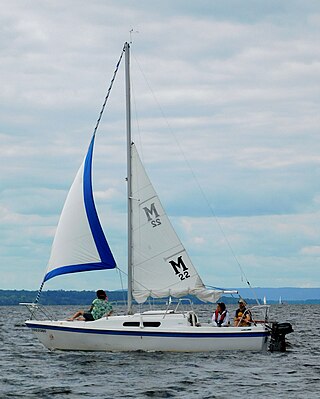Related Research Articles

The Thistle is an American planing sailing dinghy that was designed by Sandy Douglass as a one-design racer and first built in 1945.

The International 110 is an American sailboat that was designed by C. Raymond Hunt as a one-design racer and first built in 1939.
The Rhodes 19 is an American trailerable day sailer or sailing dinghy, that was designed by Philip Rhodes as a one-design racer and first built in 1958.

The Windmill is an American sailing dinghy that was designed by Clark Mills as a one-design racer and first built in 1953.
The West Wight Potter 15 is an American trailerable sailboat that was designed by Stanley T. Smith and Herb Stewart as a cruiser and first built in 1979.
The Ranger 30 is an American sailboat, that was designed by C. Raymond Hunt Associates and first built in 1977.
The Interclub Dinghy is an American sailing dinghy that was designed by Sparkman & Stephens as a one-design racer and first built in 1946. It is sailed in frostbite racing on the US east coast, particularly on Long Island Sound. Frostbite races are the series held after the normal sailing season is finished.

The Mercury 18, sometimes just referred to as a Mercury, is an American sailboat that was designed by Ernest Nunes as a one design racer and first built in 1939. The boat was one of the first one-design sailboat classes designed for plywood construction.
The Victoria 18 is an American trailerable sailboat that was designed by Canadian G. William McVay. It was built in the United States 1977 to 1983.

The Cal 24 is an American trailerable sailboat that was designed by C. William Lapworth as a Midget Ocean Racing Club (MORC) racer and first built in 1958.
The Cal 2-24, also called the Cal 24-2 and the Cal 24 Mark II is an American trailerable sailboat that was designed by C. William Lapworth as a racer and first built in 1967.
The Cal 3-24, also called the Cal 24-3 and the Cal 24 (Hunt) is an American trailerable sailboat that was designed by C. Raymond Hunt Associates as a racer-cruiser and first built in 1983.
The Captiva 240 is an American trailerable sailboat that was first built in 1984. The boat is a development of the O.H. Rodgers-designed Rodgers 24 racer, modified for use as a racer-cruiser by Walter Scott by giving it a new keel and sailing rig.

The MacGregor 22 is an American trailerable sailboat that was designed by Roger MacGregor as a cruiser and first built in 1967.
The Pearson 23 is an American trailerable sailboat that was designed by William Shaw as a cruiser and first built in 1978.
The Pearson Lark, also called the Lark 24, is an American trailerable sailboat that was designed by William Shaw as a cruiser and first built in 1966.

The O'Day 302 is an American sailboat that was designed by C. Raymond Hunt Associates as a cruiser and first built in 1988.
The Ranger 24 is an American trailerable sailboat that was designed by Raymond H. Richards as an International Offshore Rule Quarter Ton class racer-cruiser and first built in 1974.
The Venture 22 is an American trailerable sailboat that was designed by Roger MacGregor as a cruiser and first built in 1968.
The Venture 222 is an American trailerable sailboat that was designed by Roger MacGregor as a cruiser and first built in 1971.
References
- 1 2 3 4 McArthur, Bruce (2020). "210 sailboat". sailboatdata.com. Archived from the original on 28 November 2020. Retrieved 28 November 2020.
- ↑ McArthur, Bruce (2020). "Raymond Hunt (C.R. Hunt & Assoc.) 1908 - 1978". sailboatdata.com. Archived from the original on 21 November 2020. Retrieved 28 November 2020.
- 1 2 3 4 5 6 7 Sherwood, Richard M.: A Field Guide to Sailboats of North America, Second Edition, pages 130-131. Houghton Mifflin Company, 1994. ISBN 0-395-65239-1
- 1 2 3 4 "C. Raymond Hunt's "Ten" Series (110-210-310-410-510-1010)". Classic Sailboats. 2 November 2014. Archived from the original on 28 May 2020. Retrieved 28 November 2020.
- ↑ McArthur, Bruce (2020). "Pearson Yachts 1958 - 1990". sailboatdata.com. Archived from the original on 28 November 2020. Retrieved 28 November 2020.
- ↑ McArthur, Bruce (2020). "Graves Yacht Yard (USA) 1898 -". sailboatdata.com. Archived from the original on 28 November 2020. Retrieved 28 November 2020.
- ↑ "Shaw Yacht, Inc". Bizpedia. 2020. Archived from the original on 28 November 2020. Retrieved 15 April 2022.
- ↑ McArthur, Bruce (2020). "210 Class Home Page (USA)". sailboatdata.com. Archived from the original on 28 November 2020. Retrieved 28 November 2020.